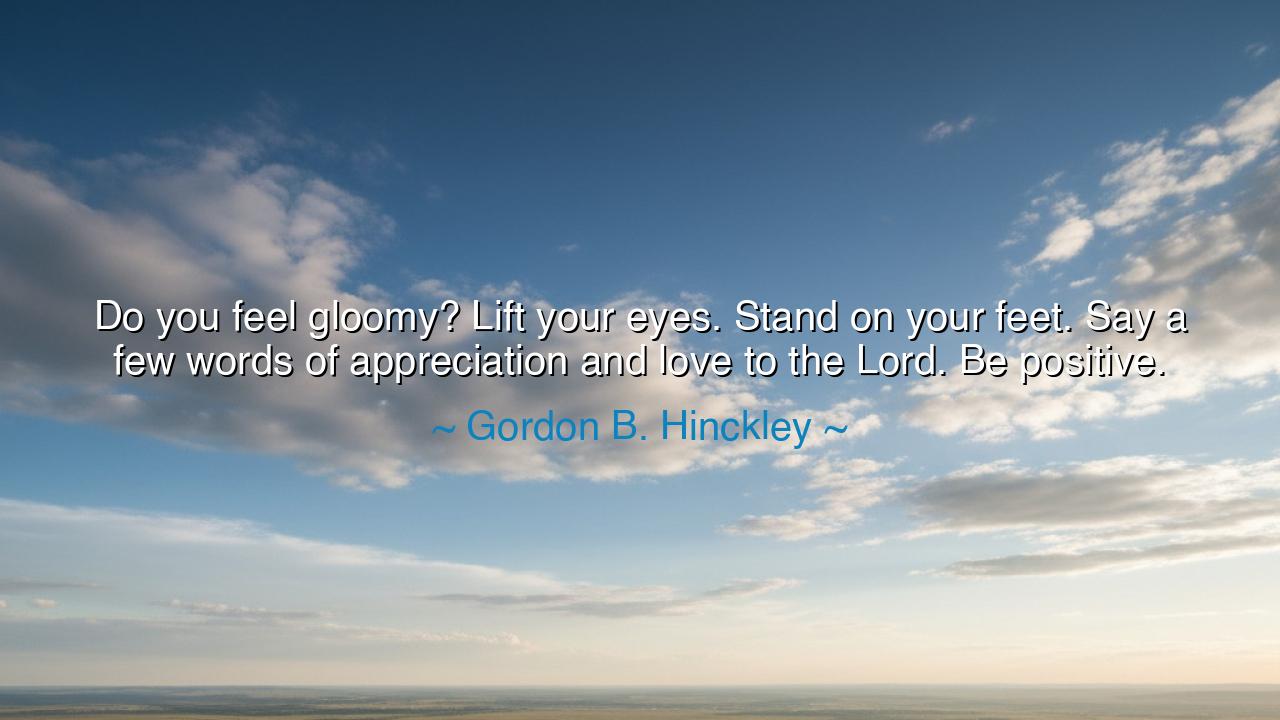
Do you feel gloomy? Lift your eyes. Stand on your feet. Say a
Do you feel gloomy? Lift your eyes. Stand on your feet. Say a few words of appreciation and love to the Lord. Be positive.






The words of Gordon B. Hinckley—“Do you feel gloomy? Lift your eyes. Stand on your feet. Say a few words of appreciation and love to the Lord. Be positive.”—resound like the counsel of a wise elder speaking to a weary traveler on the road of life. They are simple in form, yet within them lies a profound truth: that the posture of the body and the focus of the soul can transform despair into hope. To lift your eyes, to stand on your feet, and to speak words of gratitude is not only an act of faith, but a declaration of defiance against gloom, sorrow, and hopelessness.
The ancients knew well that when the heart sinks, the body often follows. Shoulders stoop, eyes fall, and the spirit becomes heavy. Yet Hinckley’s words echo the wisdom of the Psalms: “I will lift up mine eyes unto the hills, from whence cometh my help.” To lift the eyes is to remember that there is always something higher, something greater than the present trial. To stand on your feet is to reclaim dignity, to refuse to be crushed by grief. And to offer words of love and gratitude is to call upon the most powerful force of all—the remembrance of blessings even in times of darkness.
History itself bears witness to the strength of gratitude in times of trial. Consider Corrie ten Boom, who suffered in the horrors of a Nazi concentration camp. Amid starvation, cruelty, and despair, she and her sister Betsie chose to pray, to thank God even for the fleas in their barracks, believing that all things could serve a higher purpose. It was later revealed that those very fleas kept the guards from entering their quarters, sparing them from worse abuses. In their story, as in Hinckley’s words, we see that thanksgiving transforms suffering into endurance, and endurance into triumph.
To be positive is not to deny sorrow, but to place it within the larger frame of faith. Life will always bring moments of gloom, but gloom does not have to master the soul. Hinckley’s counsel is a reminder that the first steps toward renewal are simple, physical acts: look upward, rise to your feet, and speak with gratitude. These are not grand miracles, but daily disciplines—accessible to all, regardless of wealth, power, or station. They are weapons given freely to every human heart.
Yet, this path demands choice. It is easier to remain bowed down, to rehearse grievances, to let bitterness take root. But to lift the eyes is to make an act of courage. To thank the Lord is to acknowledge that even in hardship, life is still laced with goodness. The ancients called this fortitude, the strength to remain steadfast and grateful when all around cries for despair. Hinckley clothes this ancient virtue in simple words, urging us not to surrender, but to stand.
The lesson, then, is clear: when gloom surrounds you, resist the temptation to remain low. Look upward to hope, rise with dignity, and give thanks for what is still yours. In this practice, sorrow will lose its grip, and the spirit will find new strength. Gratitude will become a wellspring of resilience, and positivity will turn despair into possibility.
So, dear listener, engrave these words upon your heart. The next time your soul feels burdened, remember Hinckley’s call: lift your eyes, stand on your feet, speak gratitude, and be positive. These simple acts will awaken courage within you and remind you that the human spirit, strengthened by faith and gratitude, can overcome even the darkest of days. For the one who chooses to look up and to give thanks has already begun to rise.






KVNguyen Kiem Vinh
I find this statement inspiring but also wonder about accessibility. For someone experiencing severe depression or chronic gloom, would these steps feel sufficient or realistic? How can individuals integrate such practices into daily life without feeling pressured or guilty if their mood doesn’t instantly improve? It raises broader questions about combining spiritual guidance, positive psychology, and practical coping strategies for emotional health.
HBNguyen huu binh
This quote makes me reflect on the interplay between positivity, gratitude, and belief systems. While it emphasizes speaking to the Lord, could secular versions—like expressing gratitude to oneself or others—offer similar mental and emotional benefits? I’m interested in whether the act of vocalizing appreciation, combined with physical and mental shifts, produces measurable improvements in outlook and overall well-being.
XTXuan Tien
Reading this, I feel curious about the connection between physical posture, verbal expression, and emotional state. Could standing up and speaking affirmations genuinely improve mood, independent of religious context? I also wonder how consistent practice might influence long-term positivity and resilience. Is this advice more effective when combined with daily spiritual routines, meditation, or mindfulness practices?
NQNhat Quyen
I find this quote uplifting because it combines action, gratitude, and spirituality as a pathway out of gloom. I wonder how much the spiritual component matters for people of different beliefs—would the advice be equally effective for someone who is not religious? It also raises questions about the role of intentional behavior in shifting mood, and whether simple gestures like standing, looking up, or speaking words of appreciation can have measurable psychological benefits.